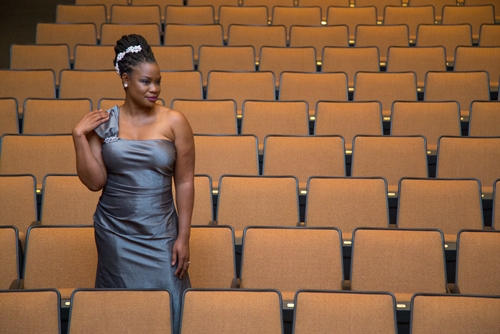The tranquil smile Rhea Olivaccé wears as she sings an aria masks the sweat equity she puts in before every performance.
Olivaccé is an adjunct professor of voice at Western Michigan University, but it’s her career as a freelance opera singer that drives her to take chances and pursue something she didn’t think was possible as a child growing up on the island of Dominica in the Caribbean.
Her childhood home was filled with singing and music, and as such it was treated as a hobby and a wonderful talent to have. Her grandfather was a well-known tenor and her aunt was an equally admired Caribbean singer and one of the few strong women in Olivaccé’s life who made singing a career.
“But these talents always take a backseat to academics, especially when you grow up in a Third World country where people are worrying about whether their kids have enough to eat,” Olivaccé said.
Her earliest musical training happened while singing with church choirs in Dominica. During her teen years, she began to focus on a rhythm, blues and pop style, incorporating her Caribbean background where it fit.
“A lot of African Americans are raised in areas where they have no access to classical music,” Olivaccé said. “I was not exposed specifically to classical music, because of where I lived. I listened to reggae and calypso, country and gospel.”
The soprano’s decision to pursue a formal musical education came after her mother passed away when Olivaccé was 16 years old. Earlier, her mother heard her sing Every Step We Take at someone else’s funeral and requested that, when the time came, her daughter sing this same song at her own funeral.
“That was hard, but she said, ‘I want you to sing it at my funeral and everyone will know what I know — what a wonderful singer you are,’” Olivaccé said. “She was always my biggest fan and knew my talent the best.”
Two years later, Olivaccé was auditioning for a spot in the music program at Florida International University, singing five different versions of Amazing Grace. She was admitted on a probationary basis and double majored in vocal performance and psychology, the latter as a way to create some measure of job security.
To augment the classroom learning, she was writing her own songs and singing at local events and in bars. She eventually realized she had to choose between music and a career as a therapist, and settled on the former.
Her turning point came when she landed a chorister’s role in the opera Norma while still an undergrad.
“I got to see this dramatic soprano appear loud on stage and to feel the power of her voice, and that — coupled with the orchestra and the theater company — was hypnotic and thrilling for me,” Olivaccé said. “Seeing her and sharing the stage with her was such a powerful experience.”
At the university’s theater, Olivaccé ended up performing the role of Gasparina in Haydn’s La Cantarina and the title role in Holst’s Savitri.
Although she had never given much thought to pursuing graduate degrees, the director of FIU’s Music School encouraged her to go on and investigate graduate programs she could get accepted into. She auditioned and was accepted to the University of Michigan, where she earned a master’s and a Ph.D.
While at U of M, she performed in four full operas, which she said was a “big deal,” because sopranos are a dime a dozen, while tenor and bass singers are much more difficult to find. These performances included the leading soprano roles of Tatyana in Tchaikovsky’s Eugene Onegin and Mimi in Puccini’s La Bohème, La Contessa in Mozart’s Le Nozze di Figaro and Suzel in Mascagni’s L’amico Fritz. She has also taught private voice lessons and worked with young artist programs at various opera companies around the country.
She and her husband settled in Kalamazoo in 2012 after he took a job with Kalamazoo College as the head soccer coach. Meanwhile, Olivaccé continues to audition and perform, mostly in Ohio and Wisconsin, when not teaching.
Because she is African American, Olivaccé said she sometimes questions whether those she auditions for have the imagination to see her in a role traditionally played by a white singer. She said she’s fortunate to follow such opera legends of color as Leontyne Price and Marian Anderson.
“It’s a lot easier when you can see someone who looks like you. That was hard for me in a way, because where I grew up, I was not a minority,” she said. “I choose every day to focus on the undying passion and fire I have for performing. I am at my best when I’m singing.”





